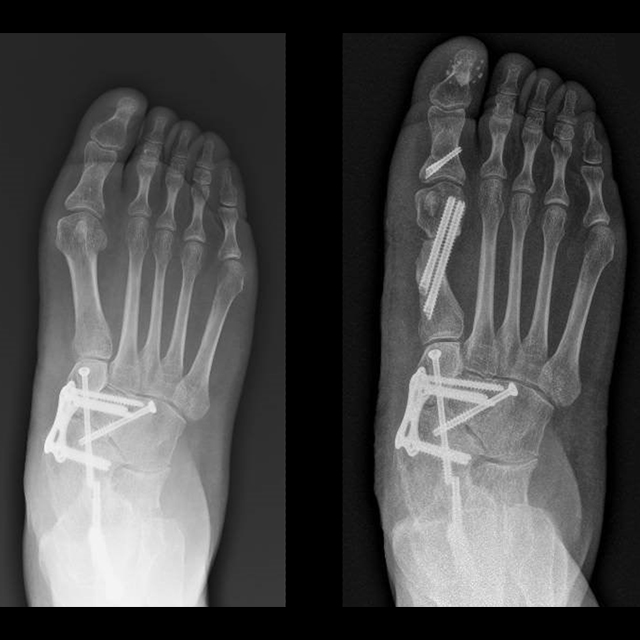Running Hot and Cold — Comprehensive Orthopaedic Trauma Care in One Practice
Babar Shafiq treats a wide spectrum of trauma cases, meeting patients’ immediate and long-term needs.

Babar Shafiq
In orthopaedic trauma, “hot trauma” refers to cases presenting immediately after injury — those with acute needs that demand urgent intervention. These injuries are often complex, involving multiple fractures and extensive tissue damage. As an orthopaedic surgeon at a Level I trauma center, Babar Shafiq has built an extensive and robust practice dedicated to treating such hot trauma.
However, for many patients, the journey doesn’t end with the acute phase of their injury. Conditions like acetabular fractures may lead to painful post-traumatic arthritis years later, prompting patients to seek further care. In cases of post-traumatic hip arthritis, total hip arthroplasty is a proven solution to alleviate pain, stiffness and functional limitations. These elective surgeries for long-term sequelae represent “cold trauma,” another major focus of Shafiq’s practice.
For Shafiq, the essence of being an orthopaedic trauma surgeon lies in the ability to treat a diverse array of cases. “That’s why trauma surgeons do trauma to begin with,” he says. “We want to be really broad and capable.” After years spent honing his skills in complex fracture repairs, Shafiq now extends his expertise to patients requiring arthroplasty, offering total hip replacements even in the most challenging cases.
“Increasingly, as our population ages, the fractures we see are more comminuted and unrepairable,” Shafiq explains. “For patients with preexisting arthritis, performing a total hip replacement is complex but critical. It’s become an integral part of my practice given my expertise in acetabular surgery and my passion for arthroplasty.”
Patients who present to the emergency department with hip fractures often undergo hemiarthroplasty due to its relative simplicity. However, Shafiq explains, “When older people with preexisting arthritis undergo partial hip replacement, or a “hemi,” they frequently experience residual pain, requiring conversion to a total hip replacement.” In his practice, Shafiq offers primary total hip arthroplasty to such patients, ensuring optimal outcomes.
“There is a lot of disability after trauma,” Shafiq says, “including nonunions, infected nonunions, malunions, deformity and arthritis. I’m able to treat those patients with post-traumatic arthritis from old fractures, guiding them to their eventual hip replacement.” He will soon expand this offering to include robotic hip arthroplasty.
Beyond his surgical practice, Shafiq is dedicated to research and to educating the next generation of orthopaedic surgeons, who benefit from his diverse skills and caseload. As the associate program director for the orthopaedic surgery residency at Johns Hopkins, he not only mentors the residents, but also delivers national educational courses through the Orthopaedic Trauma Association and the AO Foundation. In his current research, which involves wide-ranging clinical explorations into surgical robotics, compartment syndrome, open fracture treatment and ballistic fractures, he is also exploring the most effective ways to train residents to perform percutaneous pelvic surgery.
Through his passion for serving the immediate and long-term needs of patients with orthopaedic trauma and his commitment to educating future orthopaedic surgeons, Shafiq embodies the comprehensive care philosophy that is the hallmark of Johns Hopkins Orthopaedics.
To learn more about Babar Shafiq and his research, click here.
Related Reading
-
Toward Personalized, Data-Driven Care for Patients with Musculoskeletal Pain
The approach will enable predictions about treatment outcomes with more precision and customized support that builds on patients’ individual strengths.

-
Embracing a Minimally Invasive Philosophy in Foot and Ankle Surgery
Surgeons find minimally invasive techniques are viable options in unique and complex foot and ankle conditions, and work where other approaches have failed.

